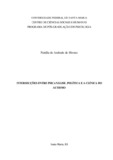| dc.creator | Moraes, Natália de Andrade de | |
| dc.date.accessioned | 2021-07-22T18:14:52Z | |
| dc.date.available | 2021-07-22T18:14:52Z | |
| dc.date.issued | 2017-05-15 | |
| dc.identifier.uri | http://repositorio.ufsm.br/handle/1/21571 | |
| dc.description.abstract | This research aimed to problematize the psychoanalysis-politics relationships, in connection
with psychoanalysis practices on autism. Therefore, there were conducted two studies. The
first one is a systematic literature review, centered in the following question: How, or through
which operators, might be produced a rigorous articulation between the politics and
psychoanalysis fields? The results, narratively presented, composed a complex conceptual
table that embraces reflections on politics, social and power as constitutive parts of the history
of psychoanalysis, definitely marked by the political field. The second study aimed to
problematize the autism statute in the contemporary, as well as the place defined to autistic
subjects in a social crossed by neoliberal and capitalist speeches. Thus, it was proposed the
analysis of an advertisement video referring to the “the hug jacket”, a product destined to
calm down autistic children. In an ultra-individualist scenario, objects‟ imperative and lacking
social bonds, the autistic subject emerges in the place of weirdness when reflecting on the
contemporary tendency of the Other‟s absence, the monotony and the isolation. In such
context, the psychoanalysis proposes a possible way out to the capitalist speech throughout
the introduction of the innovative, in the support of a desire that enables the subject its tiny
singularity that it owns. Finally, the research reflected on the important psychoanalysis
function, which is political, as a speech that enables the alterity registration and the rescue of
difference, desire and the sovereignty of the Other. As for the psychoanalysis practices on
autism, this function is expressed by the non-withdrawal of psychoanalysts in promoting with
the subjects an encounter to what is possible, that pull them out of the helplessness condition
to which they are exposed by normative strategies. | eng |
| dc.description.sponsorship | Coordenação de Aperfeiçoamento de Pessoal de Nível Superior - CAPES | por |
| dc.language | por | por |
| dc.publisher | Universidade Federal de Santa Maria | por |
| dc.rights | Attribution-NonCommercial-NoDerivatives 4.0 International | * |
| dc.rights.uri | http://creativecommons.org/licenses/by-nc-nd/4.0/ | * |
| dc.subject | Psicanálise | por |
| dc.subject | Política | por |
| dc.subject | Clínica | por |
| dc.subject | Autismo | por |
| dc.subject | Ética | por |
| dc.subject | Psychoanalysis | eng |
| dc.subject | Politics | eng |
| dc.subject | Psychoanalysis practices | eng |
| dc.subject | Autism | eng |
| dc.subject | Ethics | eng |
| dc.title | Intersecções entre psicanálise, política e a clínica do autismo | por |
| dc.title.alternative | Intersections among psychoanalysis, politics and psychoanalysis practices on autism | eng |
| dc.type | Dissertação | por |
| dc.description.resumo | Esta pesquisa buscou problematizar as relações psicanálise-política, em articulação à clínica
do autismo. Para tanto, foram realizados dois estudos. O primeiro constituiu-se como revisão
sistemática de literatura, centrada na questão: Como, ou a partir de que operadores, pode-se
produzir uma articulação rigorosa dos campos político e psicanalítico? Os resultados,
apresentados narrativamente, compuseram um complexo quadro conceitual que situa as
reflexões acerca da política, do social e do poder como parte constitutiva da história da
psicanálise, definitivamente marcada pelo campo político. O segundo estudo buscou
problematizar o estatuto do autismo no contemporâneo, bem como o lugar reservado aos
sujeitos autistas em um social atravessado pelos discursos neoliberal e capitalista. Para tal,
propôs a análise de um vídeo publicitário referente à “jaqueta do abraço”, produto destinado a
acalmar crianças autistas. Em um cenário ultra-individualista, imperativo de objetos e carente
de laços sociais, o sujeito autista emerge no lugar do estranho ao refletir a tendência
contemporânea à ausência do Outro, à mesmice e ao isolamento. Nesse contexto, a psicanálise
propõe uma saída possível do discurso capitalista através da introdução do novo, na
sustentação de um desejo que possibilite ao sujeito a pequena singularidade que é sua.
Finalmente, a pesquisa refletiu a importante função da psicanálise, função essa que é política,
enquanto discurso que possibilita a inscrição da alteridade e o resgate da diferença, do desejo
e da soberania do outro. No que tange à clínica do autismo, essa função se exprime na não
desistência dos psicanalistas em promover com os sujeitos um encontro possível, que os retire
da condição de desamparo a que são submetidos pelas estratégias normativas. | por |
| dc.contributor.advisor1 | Perrone, Claudia Maria | |
| dc.contributor.advisor1Lattes | http://lattes.cnpq.br/7269640006431486 | por |
| dc.contributor.referee1 | Gurski, Roselene Ricachenevsky | |
| dc.contributor.referee2 | Torossian, Sandra Djambolakdjian | |
| dc.creator.Lattes | http://lattes.cnpq.br/6152382832832009 | por |
| dc.publisher.country | Brasil | por |
| dc.publisher.department | Psicologia | por |
| dc.publisher.initials | UFSM | por |
| dc.publisher.program | Programa de Pós-Graduação em Psicologia | por |
| dc.subject.cnpq | CNPQ::CIENCIAS HUMANAS::PSICOLOGIA | por |
| dc.publisher.unidade | Centro de Ciências Sociais e Humanas | por |



